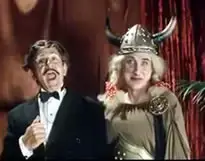The last words of Spike Milligan
Spike Milligan (1918 – 2002) is described on his gravestone (of which more later) as ‘Writer, Artist, Musician, Humanitarian, Comedian’. He was certainly all of those things, but it is as a comic genius and the father of post-war British comedy that he is best remembered.
His epitaph reads:
I told you I was ill.
His gravestone, on which the words are inscribed in Gaelic (repeating a joke that Milligan had used in his stage act for several years).
Background to Spike Milligan’s last words

A biography of Milligan might well begin with:
‘Terence Alan Patrick Seán Milligan was born in India to an English mother and an Irish father who was serving in the British Army’.
That factual record says much about the character and comic preoccupations of the man. War (and peace), the British army and colonial legacy feature throughout his comic and literary work.
A life-long sufferer from bipolar disorder, he could be moody and irascible as well as gentle and possessed of an inspired comic genius. I once heard him on stage, and clearly depressed, replying to a heckler who complained that his act was anti-Indian, say “I’m not racist. I hate everybody”. In his non-depressed moments, he loved everybody.
Milligan’s comedy frequently employed wordplay. For example:
[Army Officer]: “We marched for the best part of a day.”
[Voice in background]: “They left the worst part to us”.
&
“Hello, I’m Spike Milligna – the well-known spelling mistake”.
Another common strand was visual and musical/sound-effect humour. His ‘Fresh Fruit Song’ sketch is a classic example of such.
As the writer and performer of the seminal Goon Show and ‘Q’ series, he was a hero figure and inspiration to many of the prominent British comedy writers and performers of the late 20th century. It’s difficult to imagine that Monty Python’s Flying Circus would have existed but for Milligan’s influence.
Spike Milligan died of of liver disease on 27th February 2002. He had once joked that a suitable headstone inscription would be “I told you I was ill” and that is indeed what is on his own headstone. The words are, in a reference to his Irish ancestry, (and because the local Diocesan authorities thought it too lighthearted an inscription to be engraved in English), in Gaelic. The full version reads:
Love, Light, Peace
I told you I was ill

